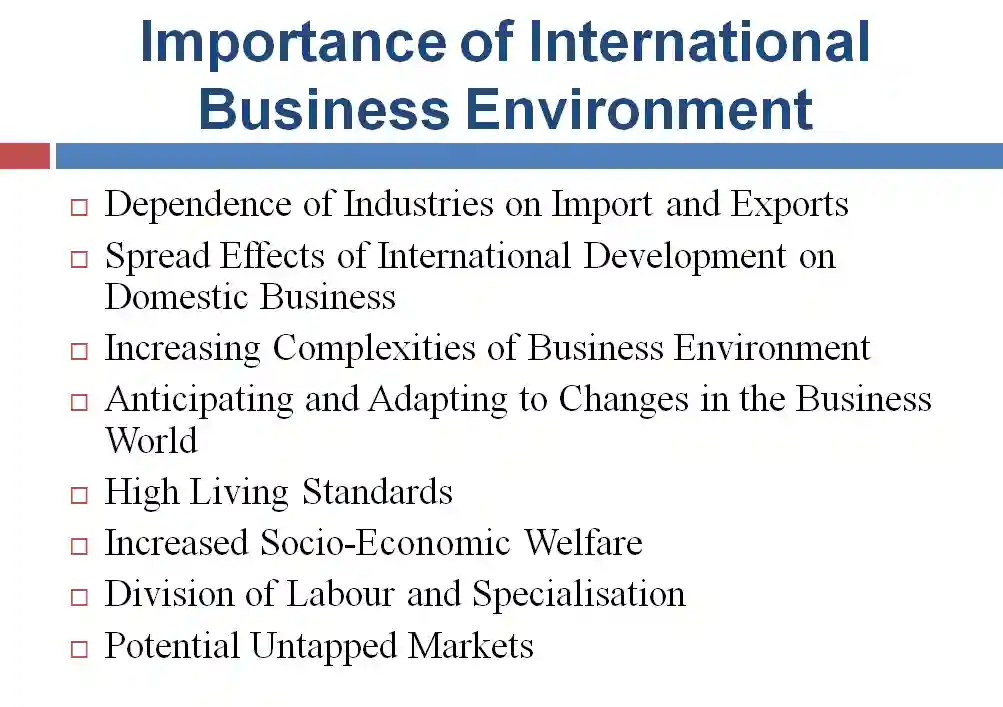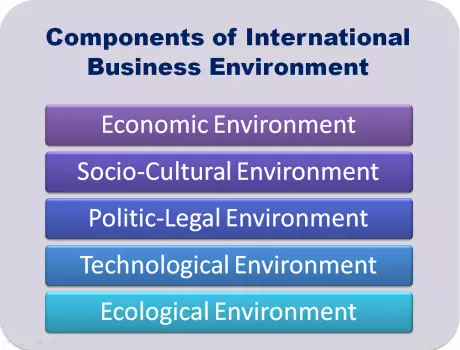Table of Contents:-
- International Business Environment Meaning
- Importance of International Business Environment
- Components of International Business Environment
International Business Environment Meaning
The environment of every organisation is the total collection of all conditions, events and influences that surround and affect it. The international business environment of all conditioners in an international enterprise has considerable impact and influence on the scope and direction of its activities. The enterprise, on the other hand, has very little control over its international environment. Therefore, the enterprise’s primary job is to identify with the environment in which it operates and formulate its policies by the forces that operate in its environment.
International business differs from domestic business because the environment changes when a firm crosses international borders. Typically, a firm understands its domestic environment quite well but needs to become more familiar with the environment in other countries and invest more time and resources into understanding the new environment.
The international business environment is the total of all the external forces working upon the firm as it goes about its affairs in foreign and domestic markets.
The environment can be classified into domestic, foreign, and international spheres of impact. The domestic environment is familiar to managers and consists of uncontrollable external forces affecting the firm’s home market.
Importance of International Business Environment
Understanding the global business environment is important, because of the following reasons:
- Dependence of Industries on Imports and Exports
- Spread Effects of International Development on Domestic Business
- Increasing Complexities of the Business Environment
- Anticipating and Adapting to Changes in the Business World
- High Living Standards
- Increased Socio-Economic Welfare
- Division of Labour and Specialisation
- Potential Untapped Markets
1) Dependence of Industries on Imports and Exports
Industries that depend on imports or exports face considerable influence from the international economic environment. The international business environment is extremely important for industries directly depending on imports or exports and import-competing industries. For example, a recession in foreign markets or the implementation of protectionist policies by other countries may create difficulties for industries that depend on exports. On the other hand, a boom in the export market or a relaxation of the protectionist policies can greatly benefit export-oriented industries.
2) Spread Effects of International Development on Domestic Business
Experts commonly agree that significant international events have substantial consequences for domestic business. For example, the recent increase in oil prices has seriously affected several economies. This increase in oil prices has led to an increase in the cost of production and the prices of various products, such as fertilisers, synthetic fibres, etc. The demand for natural fibres increased because of the oil crisis.
3) Increasing Complexities of the Business Environment
In today’s era of economic liberalization, privatization, and globalization, the business environment is becoming increasingly complex, unstable and unpredictable. The environment is the result of several interacting and constantly changing social and economic forces and thus remains in a state of flux. As the environment changes, it creates challenges, opens up new opportunities and affects the strengths and weaknesses of different business segments.
Related Articles:
- nature of business meaning
- nature of international business
- scope of international marketing
- determinants of economic development
- nature of capital budgeting
- nature of international marketing
4) Anticipating and Adapting to Changes in the Business World
A truly agile organisation understands the importance of making strategic adjustments in business planning and operation but is also able to project the upcoming changes from the current scenario and take appropriate defensive or inoculative measures. On the other hand, an organization that remains unresponsive to shifts in the business domain is at a higher risk of confronting the unpredictable characteristics of the business. This may lead to the need for more expensive and strenuous adjustments later or potentially facing exit from the market in a competitive context.
The international business allows companies to identify potential opportunities and threats in the international market. It enables companies to develop effective strategies to compete with other businesses in the global arena. It helps organizations navigate through cultural differences and complex regulations that may impact their operations.
Therefore, having a comprehensive understanding of the global business environment is essential for any business that aims to succeed in today’s interconnected world.
5) High Living Standards
Comparative cost theory indicates that the countries which have the advantages of human resources, raw materials, natural resources and climatic conditions in producing particular goods can produce products of high quality and at low cost. Customers in multiple countries can buy more products with the same amount of money. In turn, It can improve living standards by increasing purchasing power and consuming high-quality products.
6) Increased Socio-Economic Welfare
International business enhances the consumption level and economic welfare of the people of trading countries. For example, in China, people enjoy products from various countries like Coca-Cola, Japanese electronics, McDonald’s offerings, and Brazilian coffee. Therefore, the Chinese consumption levels and socio-economic welfare have increased.
7) Division of Labour and Specialisation
Division of labour and specialization is a fundamental aspect of international business. This method encompasses countries dedicating their attention to generating goods and services that match their strengths, resources, and expertise. For example, Kenya specializes in tea, Brazil in coffee, Japan in automobiles and electronics, India in textiles etc.
8) Potential Untapped Markets
International business offers the opportunity to thoroughly explore and harness the potential of untapped markets that remain unrealized. By tapping into untapped markets, companies can gain a competitive advantage and establish themselves as leaders in their respective fields. These markets provide the opportunity for the business to sell their product at a higher price than in domestic markets. For example, Bata sells its shoes in the UK at £ 100 (around Rs. 8000) price is around Rs. 1200 in India.
Components of International Business Environment
The basic structure of the international business environment is very complex, dynamic and multifarious. Therefore, it is very significant to study, understand and conceptualise the structure of the international business environment comprehensively.
The structure of the international business environment includes the following elements:
- Economic Environment
- Socio-Cultural Environment
- Political-Legal Environment
- Technological Environment
- Ecological/Natural Environment
1) Economic Environment
The economic environment refers to all the factors that make a country appealing to foreign companies, it can be very different from one country to another as all countries have varying economic environments. Countries are classified into developed, developing, or underdeveloped categories depending on their economic growth.
Within each category, there are major variations, but overall the more developed countries are the rich countries, the less developed the poor ones, and the newly industrialising (those moving from poorer to richer). These distinctions are usually made based on gross domestic product per capita (GDP/capita). Enhanced economic development is often accompanied by improved education, infrastructure, health care, technology, and similar facets.
Generally, advanced countries have excellent infrastructure, education, and advanced technology. However, developing countries often have greater growth potential due to increasing demand. It’s important for businesses to carefully consider the economic environment of a country before investing in it. By doing so, they can maximize their chances of success and make informed decisions.
2) Socio-Cultural Environment
The Socio Cultural Environment is an essential factor that needs to be taken into account by an international manager. Culture and human behaviour have a significant impact on international decisions. Therefore, while planning overseas operations, multinational companies must take into account the socio cultural environment of the host country.
Socio-cultural environment involves analyzing the cultural norms, values, beliefs, and behaviours of the host country. This knowledge helps international managers to adapt their strategies and operations to fit the local culture, which can lead to better relationships with customers, suppliers, and employees.
For example, a company that sells cold drinks may need to adjust its marketing strategy in a country where cold drink consumption is frowned upon. Similarly, a company that values individuality may need to adjust its management style in a country where collectivism is the norm.
3) Political-Legal Environment
The political and legal environment of a country has a significant impact on the legislation and government rules and regulations under which a foreign company operates. Every country in the world has its unique system of laws and a foreign company operating within it has to abide by these laws for as long as it continues to operate there. Therefore, foreign companies need to conduct thorough research and seek legal advice before entering a new market.
So that they can understand the political and legal environment of the country they wish to operate in. This includes an understanding of the country’s political structure, legal system, and regulatory framework. If a company fails to understand these laws and regulations it can result in severe outcomes, including fines, legal action, and even expulsion from the country.
4) Technological Environment
The technological environment, like its political and legal counterparts, has considerable influence on International Business. Technology serves as a major driving force both in international marketing and the push towards a more global marketplace.
Technological advances influence every aspect of the marketing process. The ability to gather data on markets, management control capabilities and the practicalities of carrying out business operations internationally has been revolutionised in recent years with the advances in electronic communications. Advancement in technology has become like a force of nature, transforming the economy, schools, consumer habits, and the very character of modern life.
5) Ecological/Natural Environment
Ecological environment refers to all living and non-living things around us within which we live and work. It is the foundation of our existence. People’s relationship with the ecological environment is two-fold. On one hand, Individual lives and work are influenced by the ecological environment in which they reside. On the other hand, the ecological environment is affected by the actions and decisions of the people. Managers must consider ecological factors when making decisions
Through ecology, one can understand the relationship of people and other living beings with their environment, such as water, soil, and air. Water, land, and air pollution are of great concern to all. Land may be polluted by industrial waste such as packaging and waste extract. Water pollution may be caused, e.g. by hazardous waste and sewage. Air pollution can be caused by a variety of sources, such as CNG, smoke, acid rain, vehicle exhaust fumes, and carcinogens from manufacturing processes.
Pollution is a major concern in today’s world, and it affects all aspects of our lives. Land pollution can result from industrial waste, such as packaging materials. Water pollution can be caused by hazardous waste and sewage. Air pollution can come from a variety of sources, including acid rain, vehicle exhaust fumes, and carcinogens from manufacturing processes.
You May Also Like:-


